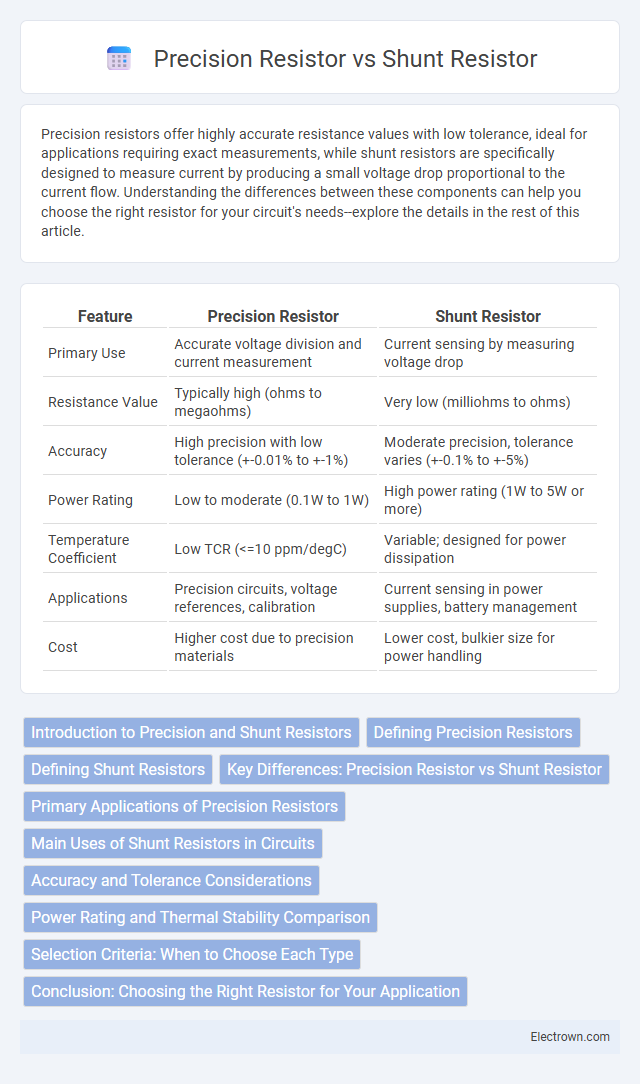Precision resistors offer highly accurate resistance values with low tolerance, ideal for applications requiring exact measurements, while shunt resistors are specifically designed to measure current by producing a small voltage drop proportional to the current flow. Understanding the differences between these components can help you choose the right resistor for your circuit's needs--explore the details in the rest of this article.
Table of Comparison
| Feature | Precision Resistor | Shunt Resistor |
|---|---|---|
| Primary Use | Accurate voltage division and current measurement | Current sensing by measuring voltage drop |
| Resistance Value | Typically high (ohms to megaohms) | Very low (milliohms to ohms) |
| Accuracy | High precision with low tolerance (+-0.01% to +-1%) | Moderate precision, tolerance varies (+-0.1% to +-5%) |
| Power Rating | Low to moderate (0.1W to 1W) | High power rating (1W to 5W or more) |
| Temperature Coefficient | Low TCR (<=10 ppm/degC) | Variable; designed for power dissipation |
| Applications | Precision circuits, voltage references, calibration | Current sensing in power supplies, battery management |
| Cost | Higher cost due to precision materials | Lower cost, bulkier size for power handling |
Introduction to Precision and Shunt Resistors
Precision resistors offer highly accurate resistance values with minimal tolerance and low temperature coefficients, making them ideal for applications requiring exact voltage and current control. Shunt resistors are designed to measure current by producing a precise, low-resistance voltage drop, often used in power monitoring and management systems. Both types play critical roles in electronic circuits, where precision resistors ensure stability and accuracy, while shunt resistors facilitate precise current sensing.
Defining Precision Resistors
Precision resistors are electronic components designed to offer highly accurate and stable resistance values with very low tolerance, often within +-0.1% or better. These resistors are critical in applications requiring exact voltage control, current sensing, and signal conditioning, ensuring minimal deviation over temperature and time. Unlike shunt resistors, which primarily measure current by generating a proportional voltage drop, precision resistors emphasize resistance value stability and accuracy for precise circuit performance.
Defining Shunt Resistors
Shunt resistors are low-value resistors designed to measure electric current by producing a voltage drop proportional to the current flowing through them. Unlike precision resistors, which emphasize tight tolerance and stability for accurate voltage division or signal conditioning, shunt resistors prioritize low resistance and high power dissipation to handle substantial current loads without significant heat generation. Understanding your application's current measurement needs determines whether a shunt resistor or a precision resistor is the optimal choice.
Key Differences: Precision Resistor vs Shunt Resistor
Precision resistors offer highly accurate resistance values with low tolerance, designed for applications requiring exact voltage control and measurement, while shunt resistors prioritize low resistance and high current handling to measure current by producing minimal voltage drop. Precision resistors typically have tight temperature coefficients and long-term stability, making them ideal for sensitive analog circuits, whereas shunt resistors are often constructed with robust materials to handle heavy current loads in power monitoring. The key difference lies in their primary function: precision resistors ensure circuit accuracy, whereas shunt resistors focus on current sensing through precise voltage division.
Primary Applications of Precision Resistors
Precision resistors are primarily used in applications requiring high accuracy and stability, such as instrumentation, calibration equipment, and medical devices. They ensure precise voltage division and current measurement in circuit designs where minimal tolerance and temperature coefficient are critical. Unlike shunt resistors, precision resistors provide consistent resistance values essential for reliable signal processing and control systems.
Main Uses of Shunt Resistors in Circuits
Shunt resistors are primarily used in current sensing applications to measure high currents by generating a small, precise voltage drop proportional to the current flow. They enable accurate monitoring of battery charge levels, motor control, power supplies, and overcurrent protection in electronic circuits. Unlike precision resistors that emphasize tight tolerance for voltage accuracy, shunt resistors focus on low resistance values and high power dissipation to safely handle large currents.
Accuracy and Tolerance Considerations
Precision resistors offer superior accuracy and tight tolerance levels, often within +-0.1% or better, making them ideal for applications requiring stable and reliable resistance values. Shunt resistors typically have higher tolerance ranges, such as +-1% or +-5%, and are designed primarily for current sensing rather than precise resistance measurement. Your choice depends on whether you prioritize exact resistance for signal integrity or cost-effective current measurement with acceptable tolerance.
Power Rating and Thermal Stability Comparison
Precision resistors typically have lower power ratings, ranging from 0.1W to 2W, designed to maintain tight resistance tolerances and thermal stability under varying conditions. Shunt resistors often support higher power ratings, sometimes up to 10W or more, optimized for current sensing applications where thermal dissipation is critical. Your choice between the two should consider the balance between power rating requirements and the necessary thermal stability to ensure accurate and reliable operation.
Selection Criteria: When to Choose Each Type
Precision resistors are ideal for applications requiring high accuracy and stability, such as voltage dividers or sensor calibration, due to their low tolerance and temperature coefficients. Shunt resistors are best chosen for current sensing in circuits where minimal power loss and low resistance values are critical. Your selection depends on whether you prioritize measurement accuracy or current monitoring efficiency in your electronic design.
Conclusion: Choosing the Right Resistor for Your Application
Precision resistors deliver high accuracy and stability, ideal for applications requiring exact voltage and current measurements, such as instrumentation and calibration. Shunt resistors excel in handling high currents with low resistance values, making them suitable for current sensing in power management and motor control. Selecting the right resistor depends on balancing tolerance, power rating, temperature coefficient, and the specific measurement requirements of your application.
precision resistor vs shunt resistor Infographic

 electrown.com
electrown.com